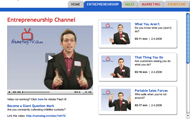
 My business card is a nametag.
My business card is a nametag.
But it doesn’t say Scott – it says Scott’s Friend.
I do this for three few reasons.
To assure people that face-to-face is coming back. And, that regardless of age, technology or personality, nothing will ever beat human contact.
To remind people that you can’t filter every experience of your life through pixels. Not if you want that life to matter.
To show people that it’s still cool to meet people the old fashion way. By touching their skin, looking them straight in the eyes and taking to them with your mouth.
IN SHORT: To market my humanity.
That’s the most underrated marketing strategy in the world: Being a person.
Here’s how you can do the same:1. Exponentially increase your activity level. Did you know it’s easier to just say hi to everybody? That’s why my personal mantra is, “Consistency is far better than rare moments of greatness.”
Think about it: How many people did you go out of your way to avoid last week? Better yet: How many people went out of their way to avoid you last week?
I think that’s the highlight of wearing a nametag all the time: It generates spontaneous moments of authentic human interaction, infused with a sprit of humor, playfulness and connection.
This happened on a recent trip to Atlanta. My flight attendant noticed my nametag and made a classic comment: “I wish all my passengers wore nametags – that way I wouldn’t have to say sir!”
It made my day. And imagine it certainly brightened hers. Do that five times a day for a decade, and you can’t help but market your humanity. But only if you’re consistent. Otherwise you’re just winking in the dark. How many of those moments did you have last week?
2. Generosity always gets people’s attention. People judge you based on two criteria: How they experience you, and how they experience themselves in relation to you. Everything else is an afterthought.
The question is: How do you want to leave people? In love with you, or in love with themselves because of you?
Ideally, the latter. Because being approachable isn’t just about being the life of the party – it’s about bringing other people to life at the party. It’s not about constantly putting on a show – it’s about giving other people a front row seat to their own brilliance.
That’s how you interact with people in a way that they will not forget: By making the feel essential. That’s how you give people the social gift of elevation: By enabling them to walk away from an interaction psychologically higher than before. And if you do it right – and if there’s nothing hollow behind it – people will leave elevated. When you out of a room, how does it change?
5. Decide where you draw the line. Humanity notwithstanding, it is possible to be too approachable. And the last thing you want to do is violate somebody’s personal boundaries. That’s a mistake too many organizations make: Not everyone who walks in the door wants an unforgettable experience. From customers to guests to employees to volunteers, sometimes you just have to back off.
For example:
When I work with retailers, I remind them that sometimes you have to stop helping people shop. When I work with airline companies, I remind them that sometimes passengers just want you to drop off a bottle of water and leave them the hell alone. And when I work with call centers, I remind them that you don’t have to use the customer’s name seventeen times a minute just to assure them that you’re listening.
Instead, try asking people how much interaction they prefer. Ask questions like, “How often would you like me to communicate with you?” and “What method of communication do you prefer most?” Otherwise, overpersonalization becomes an invasion of privacy. And by giving people too much attention, they feel smothered and intruded upon. Where are you overcommunicating?
4. Leave a tender moment alone. I once had the chance to meet one of my heroes. After his speech, I made my way to the front of the meet and greet line. We shook hands, and he asked me if I wanted to get a picture.
But for the first time in a long time, instead of fumbling over my smart phone to take a picture I could later use to prove to all my friends that we’d actually met, I told Mark that I’d rather just remember the moment instead.
So I did. And so did he. And incidentally, I never forgot that moment.
That’s what happens when you capture life with the camera of the heart. And if you want to do the same, here’s my suggestion: When you encounter the people who matter most, allow those interactions to profoundly penetrate you. Breathe in their humanity. And let the pearl sink.
Otherwise your life experience becomes nothing but an overcrowded external hard drive. What is your addiction to documentation preventing you from fully experiencing?
5. It’s never too late for the truth. Honesty is scary. Not just for you, but for the people around you. Think about it: Any time you honestly, sincerely and candidly share your opinion about something that matters to you, there’s always that one insecure, cynical twit who just has to remark, “Why don’t you tell me how you really feel?”
That’s what I never understood about the corporate world: They treat honesty like it’s some sort of organizational initiative.
Excuse me, but that’s freaking ludicrous.
First of all, if you have to tell people you are – you probably aren’t. Second, honesty shouldn’t have to be a policy. If you have to tell your people to tell the truth, you need new people. Third, if your company wants to earn a reputation of truthfulness, make honesty a constitutional ingredient – not a corporate initiative.
That’s what marketing your humanity is all about: Honoring the truth, honoring your truth and honoring other people’s truth. So what if it scares people? Tell them how you really feel. It might change everything.
Remember: You don’t need a three hundred page manual to tell you how to behave. Do you respect people enough to tell them the truth?
6. Excavate the universal human experience. What you do isn’t what you really do. There’s always something bigger. There’s always something that matters more. When I speak to recruiters and staffing professionals, I remind them that their job isn’t to manage people – it’s to enable the explosion of human potential.
Or, when I work with nurses and healthcare professionals, I teach them that their job is to give oxygen to people’s souls by allowing the dignity of self-definition. When I train company leaders, I show them that their job is to connect the duty of today with the dream of tomorrow. And when I work with relocation specialists and moving companies, I remind them that their job isn’t to move boxes – it’s to unpack the contents of the human heart.
See the difference? Your challenge is to do the same for your own work. To master the deeper humanity within your work, then embed it into your job function on a daily basis. When you go to work, what are you really doing all day, really?
REMEMBER: True power comes from personhood.
If you want to engage the people who matter most, bring all of yourself to everything you do.
Your humanity will become your company’s greatest competitive advantage.
LET ME SUGGEST THIS…
For the list called, “20 Ways to Overcommunicate Anything,” send an email to me, and I’ll send you the list for free!
* * * *
Scott Ginsberg
That Guy with the Nametag
Author, Speaker, Entrepreneur, Mentor
scott@hellomynameisscott.com
Tune in to The Entrepreneur Channel on NametagTV.com.
Watch video lessons on executing what matters.

